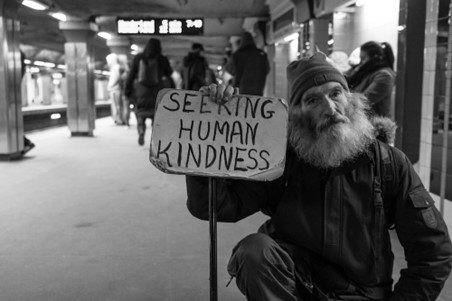
Eighth Sunday after Trinity
How do we know good from evil? It is not an easy task. In 1 Kings 3:5-12, Solomon asks God for the gift of discernment between good and evil. The parables Jesus tells, in Matthew 13: 31-33, 44-52, explore this task: Last week the parable of the wheat and the weeds warned us that we are not always best ones at judging. This week we have a similar parable about the nets of fish: all are gathered in, the good and the bad together. The other parables compare the kingdom of God to mustard seeds and leaven (yeast); whilst both tiny things that produce remarkable transformations they are also both considered dangerous and were heavily regulated under Jewish law. It was forbidden to sow mustard seed in a crop field, perhaps because the mustard seed runs amok, taking over everything, growing without boundaries, just as leaven cannot be stopped from causing fermentation and change. Why is the kingdom of God compared to these forbidden things? Perhaps to alert us to the presence of God working in very unexpected people and places. When Solomon asks for “an understanding mind” the literal translation of the Hebrew term is “a listening heart”. Again and again, we are instructed not to judge but rather to grow to understand the world as God does, with a listening heart.

9am Family Service for The Seventh Sunday After Trinity
The truth will set you free, but first it will really p*ss you off! Both of our readings today speak honestly about the difficulties of following the truth. Jeremiah, in 20:7-13, knows that speaking out will land him in trouble, people only want to hear good news and he is charged with speaking truth to power and yet he feels compelled to speak. In Matthew 10:24-39, Jesus is also compelled to speak hard words: I have not come to bring peace, but conflict. In truth the conflict is not between father & son, mother & daughter, but rather between those who are prepared to confront the impact that their choices has on others and the world around them and those who desire to remain ignorant. Speaking out has never been easy (I know, my foster daughter was arrested AGAIN last week for protesting climate policies). We are asked to live out the truth we believe, whatever the cost, knowing that in doing so we are living in and with God who reveals the truth in love.

Sixth Sunday after Trinity
It’s always all about us! We so often read the Bible, especially the parables to tell us something about us, who we are and how we should behave. Today’s readings can certainly be read in that light but actually they are all about God and what God is like. If we start with God, in whose image and likeness we are made, who we are will become clear. Isaiah 55:10-13 comes as a relief after long passages about how God’s people have made a mess a things; it promises that whatever we do, God’s purposes will still be accomplished. God’s creative Word will not return empty but, once spoken, will achieve God’s purposes. In Matthew, 13:1-9, 18-23, there is an interpretation of the parable of the sower which focuses on the kind of soil in which God’s word can take root and flourish. Yet the more important and astonishing point of the parable is that the farmer sows his seed, not just on the good soil, but everywhere: rocky, thorny, dry, the farmer doesn’t care. This God offers everyone the opportunity to thrive; this God is generous and profligate with God’s gifts. Whether the soil is rocky or thorny or good, the harvest will come and it will be a bumper crop. Our task then, is to work with God, mirroring God’s generosity and impartiality, knowing that the fruits of the harvest are in God’s hands not ours.

Fifth Sunday after Trinity
What kind of God do we want? Whatever it is, we are likely to have expectations disappointed at some point or other. In the gospel, Matthew 11:16-19, 25-30, Jesus lambasts the crowd: when God sends John they complain that he wails and mourns, when Christ comes, they complain that he is too joyous. God comes to us in many forms and most of them do not fit our expectations. This is not something new, Zechariah, 9:9-12, promises a God who will come on a colt not on a warhorse, brining peace, not conflict. We often want a God made in our image but such a God is unlikely to be of much use to us. If God is not what we expect, neither is following God. In the gospel Jesus explores the paradox of discipleship: a yoke that is easy, a burden that is light. When we lose our ego, our desires, our deeply held beliefs about who we are and how the world should be, we are not losing we are gaining. The life God offers us is beyond what we had hoped for.

4th Sunday after Trinity
Today’s gospel, Matthew 10:40-42, is all about welcome but also about the rewards we will receive from offering welcome. The nature of the reward depends upon the nature of the welcome.
The reward for welcoming the prophets and the righteous will be the same reward which they receive; both positive and negative, both awesome and exhausting.
Prophets, those who speak out against injustice, encounter conflict and opposition; the righteous, encounter the kingdom of God, because, of course, that is what they are working to change the world into.
The reward of welcoming “the little ones”, the least, the lowest and the over-looked, is not mentioned.
This is because they themselves ARE the reward.
The word welcome means to take and to hold, to receive and to accept as you would a gift or an honour. To truly welcome someone is to open ourselves to all that person is and all they bring, to value them, to learn from them and so to receive, from them, the presence of God their maker in our midst.

9am Family Service for The Third Sunday After Trinity
The truth will set you free, but first it will really p*ss you off! Both of our readings today speak honestly about the difficulties of following the truth. Jeremiah, in 20:7-13, knows that speaking out will land him in trouble, people only want to hear good news and he is charged with speaking truth to power and yet he feels compelled to speak. In Matthew 10:24-39, Jesus is also compelled to speak hard words: I have not come to bring peace, but conflict. In truth the conflict is not between father & son, mother & daughter, but rather between those who are prepared to confront the impact that their choices has on others and the world around them and those who desire to remain ignorant. Speaking out has never been easy (I know, my foster daughter was arrested AGAIN last week for protesting climate policies). We are asked to live out the truth we believe, whatever the cost, knowing that in doing so we are living in and with God who reveals the truth in love.


Second Sunday after Trinity
The magic number 12 is back. Last week we recalled that a team of 12 is a Kingdom Team, a team chosen to do the work of God in the world. Today in Matthew 9:35 - 10:23 Jesus sends out his 12 disciples, recalling the 12 tribes of Israel gathered at mount Sinai in Exodus 19:2-8. The problem with picking a people for a team is that some will be left out of the team. In this morning’s gospel Jesus’ team are sent out to do the work of God: healing, liberating, restoring, unifying. But they are only sent to the people of Israel, the original Team Kingdom, the team that were told in Exodus that they were God’s “treasured possession out of all the peoples.” This all feels a bit elitist, a bit undemocratic. Yet these teams, the one gathered by Moses in Exodus and the one gathered by Jesus in Matthew, are not formed for their own benefit. Yes, they are to be “a priestly kingdom and a holy nation” but what this means is that they have a job to do and that job is for the benefit of all God’s people. To be holy does not mean to be any better than anyone else (even Judas is on the team) it means to be anointed, consecrated, to be set aside for God to use to bring healing, freedom and life to God’s world. The People of God are only the People of God to the extent that they are being a blessing to all God’s people.

First Sunday after Trinity
Last week was Trinity Sunday, a day when we remember that God desire’s to bring us into relationship: with one another, with God, with creation. This week’s readings explore what that might look like. According to Hosea (5:15-6:6) God has caused the people’s suffering because they are not in relationship of love (with God or one another) “I desire steadfast love and not sacrifice, the knowledge of God rather than burnt offerings.” Our gospel makes it clear that God is not punishing or judging anyone: Jesus chooses Matthew, (Matthew 9:9-13, 18-26) a tax collector, a collaborator, an oppressor of his people. He does not judge him he invites him into a relationship in which he can experience a different way of living. Jesus is then asked to heal a girl, a favoured daughter of Israel but this healing is interrupted by another woman, this time an outcast. Jesus heals the outcast first, not because he favours her over the privileged child but because the child (who represents Israel) cannot be healed until the outcast are brought into a relationship of love. When we reach out in love to those in need, we are not healing them, we are healing ourselves.

Trinity Sunday
This morning we welcome Cara and Abbi as they come for baptism. Usually on a baptism Sunday we hear only the gospel reading but today’s first reading is too good and too important to miss: it is the story of genesis, the very beginning. Today we will hear Genesis 1:1-4, 26-28 the story of the creation of humanity and how community and diversity are embedded in the new life that God brings forth. Here both God and humanity are described as plural: we are made by community for community: each wonderfully different yet needing each other. Our gospel reading comes from the end of the gospel of Matthew 28:16-20. This ending turns out to be a whole new beginning in which Jesus sends out his disciples to all people everywhere.

Evensong on The Feast of Pentecost
On Sunday 28th May at 6.30pm in church, our monthly choral Evensong service with Holy Communion

9am Family Service for The Feast of Pentecost
The Feast of Pentecost.
Acts 2.1-21 tells the story of the coming of the Holy Spirit. Of course, the Holy Spirit has been around since the creation but it has been the preserve of a few: those called to lead and serve the people, priest and kings. Now the Holy Spirit is for everyone: all genders, all ages, all socio-economic groups. The whole people of God are called to lead and to serve. It is the sharing and the exercising of this gift by the entire community is what will bring new life and renewal: In John 20.19-23 Jesus breathes the spirit on his disciples recalling the spirit of God being breathed into humanity in the very beginning. It marks the potential for a new beginning, a new creation in which all God’s children are valued and included.

Seventh Sunday of Easter
Today we celebrate the Ascension. Over the last few weeks our reading shave focused on where God is to be found. Just as the Nativity shows God descending to dwell with us, so the Ascension shows us ascends to dwell with God. Both revealing that humanity and divinity are to be found together, God is not far from us but as close to us are the beat of our hearts. The question then is not, where is God? but where are we? In both Luke 24:44-53 and Acts 1:1-11 Jesus sends the disciples back into the world, not just to their people, but to all peoples. We are now the human being who can carry the transforming power of God with us. Why then do we so often persist in “stand looking up to heaven” when Jesus is sending us to witness to whole world?

Sixth Sunday of Easter
“You have made us for yourself, O Lord, and our hearts are restless until they find their rest in you.” This week’s readings, like last week’s, explore our desire for God and God’s desire for us.
In John 14:15-21, Jesus repeatedly reassures us that that we are not alone, not “orphaned” because God’s deepest desire is to dwell in us. Our journey into God starts with discovering our own belovedness. As we are loved into being we recognize the beloved nature of all God’s children without exception and discover God in one another.

Fifth Sunday of Easter
The life of the risen Christ takes root in us slowly.
In our readings today, we hear how it impacted those who first heard it. In Acts, 2:14a, 36-41, there is sorrow and regret. Peter explains that what is required is the desire to change, to repent, to turn around and be prepared to start again. Yet there is something that must come before this:
In Luke 24:13-35, the disciples on the road to Emmaus, must first voice their disappointment, their crushed hopes “we had hoped”, they say “that he was the one to redeem Israel”. It only when they can let go of their own hopes that they are ready to receive the altogether larger, all encompassing hope that Jesus offers them, not just for their own people, but for all God’s children.

Evensong for the Fourth Sunday of Easter
On Sunday 30th March at 6.30pm in church, our monthly choral Evensong service.

9am Family Service for the Fourth Sunday of Easter
It’s Good Shepherd Sunday: this year’s reading focuses not just on the sheep and the shepherds, but the sheep fold and, in particular, the gate to the fold.
We are used to hearing the sheep and shepherd stories: we understand that God promises to care for us as a shepherd cares for her flock and that we are also called to be shepherds of God’s people, caring for others. When Jesus calls himself the sheep gate, though, things get trickier. Gates open both ways: they open and close, they allow for the sheep to go in and go out.

Third Sunday of Easter
The life of the risen Christ takes root in us slowly.
In our readings today, we hear how it impacted those who first heard it. In Acts, 2:14a, 36-41, there is sorrow and regret. Peter explains that what is required is the desire to change, to repent, to turn around and be prepared to start again. Yet there is something that must come before this:
In Luke 24:13-35, the disciples on the road to Emmaus, must first voice their disappointment, their crushed hopes “we had hoped”, they say “that he was the one to redeem Israel”. It only when they can let go of their own hopes that they are ready to receive the altogether larger, all encompassing hope that Jesus offers them, not just for their own people, but for all God’s children.

Second Sunday of Easter
Jesus has done his job and now the task of living the resurrection is handed over to us.
We are not expected to do this on our own: both of today’s readings focus on the gift of the Holy Spirit that the risen Christ sends us. For Peter, Acts 2:14a, 22-32, this is a dramatic and powerful gift: he recalls the prophet Joel promising that the spirit will be poured out on all people: old and young, men and women, slave and free.
This gift allows us to dream new dreams and envisage a new future for all God’s people. For the disciples, gathered together in fear after Christ’s death, John 20:19-end, the receipt of this gift is an altogether more gentle affair. Christ breathes the spirit on them. It begins with assuring us that we are forgiven; that the worst we can do does not have to be the last word; that even places of despair and hopelessness can be places of redemption and renewal.

Easter Day
The Day of Resurrection! Our dawn service starts before the sun has risen at 5am when we light the Paschal Candle from the new Easter fire outside of the church and carry the light of Christ into the dark church. It’s worth getting up early for this magical service where we sing the first alleluia of Easter by candlelight.
Our Festival Easter Mass starts at 10.30am. Here we bless the Easter garden and renew our baptismal vows: we die with Christ and are raised by him into new life.
Our readings for both services celebrate the mystery of a God who raises the dead to life with Peter’s proclamation of the resurrection in Acts 10. 34-43 and Matthew’s telling of the discovery of the empty tomb and the first meeting with the risen Christ (Matthew 28. 1-10).
